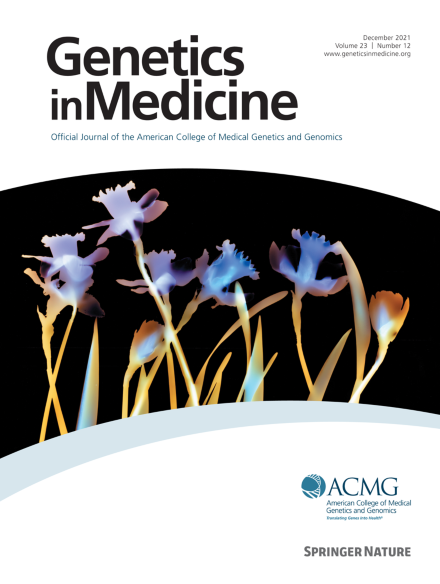Efficacy, safety, and tolerability of chenodeoxycholic acid (CDCA) in adult patients with cerebrotendinous xanthomatosis (RESTORE): A randomized withdrawal, double-blind, placebo-controlled, crossover phase-3 study
IF 6.2
1区 医学
Q1 GENETICS & HEREDITY
引用次数: 0
Abstract
Purpose
Cerebrotendinous xanthomatosis (CTX) is a rare autosomal recessive disorder caused by pathogenic variants in CYP27A1, resulting in sterol 27-hydroxylase deficiency and accumulation of cholestanol and bile alcohols. Clinical features include cholestasis, diarrhea, cataracts, tendon xanthomas, and neurological deterioration. Chenodeoxycholic acid (CDCA) is the standard treatment for CTX. The effects of CDCA withdrawal on CTX biomarkers and safety in adult patients were evaluated.
Methods
Patients (≥16 years) received CDCA 750-mg/day for 2 8-week open-label periods followed by double-blinded (DB) CDCA or placebo for 2 4-week periods. Key endpoints included changes from baseline in CTX biomarkers (23S-pentol, cholestanol, 7αC4, 7α12αC4) and the proportion of patients requiring CDCA rescue during DB periods.
Results
CDCA withdrawal resulted in a 20-fold increase in 23S-pentol and increases in cholestanol (2.8-fold), 7αC4 (50-fold), and 7α12αC4 (14-fold). During the DB withdrawal periods, 61% of participants on placebo required rescue medication. CDCA treatment was well tolerated; the most common treatment-emergent adverse events were diarrhea and headache, most of them mild/moderate in severity and not considered treatment related.
Conclusion
CDCA withdrawal caused statistically significant increases in CTX biomarkers and necessitated rescue therapy in most participants. CDCA treatment is critical for control of biochemical abnormalities and helps avoid disease progression.
鹅去氧胆酸(CDCA)在成年脑腱黄瘤病(RESTORE)患者中的疗效、安全性和耐受性:一项随机停药、双盲、安慰剂对照、交叉3期研究。
背景:脑腱黄瘤病(CTX)是一种罕见的常染色体隐性遗传病,由CYP27A1致病性变异引起,导致甾醇27-羟化酶缺乏、胆固醇和胆醇积累。临床特征包括胆汁淤积、腹泻、白内障、肌腱黄疸和神经功能恶化。鹅去氧胆酸(CDCA)是CTX的标准治疗方法。评估CDCA停药对成年患者CTX生物标志物和安全性的影响。材料和方法:患者(≥16岁)接受CDCA 750 mg/天,为期两个8周的开放标签期,随后双盲(DB) CDCA或安慰剂,为期两个4周。关键终点包括CTX生物标志物(23s -戊醇、胆固醇、7αC4、7α12αC4)与基线相比的变化,以及DB期间需要CDCA救助的患者比例。结果:停药后23s -戊醇升高20倍,胆固醇升高2.8倍,7αC4升高50倍,7α12αC4升高14倍。在DB停药期间,61%的安慰剂组参与者需要抢救药物。CDCA治疗耐受性良好;最常见的治疗不良事件是腹泻和头痛,大多数严重程度为轻/中度,与治疗无关。结论:CDCA停药导致大多数参与者CTX生物标志物显著升高,需要进行抢救治疗。CDCA治疗对控制生化异常至关重要,有助于避免疾病进展。
本文章由计算机程序翻译,如有差异,请以英文原文为准。
求助全文
约1分钟内获得全文
求助全文
来源期刊

Genetics in Medicine
医学-遗传学
CiteScore
15.20
自引率
6.80%
发文量
857
审稿时长
1.3 weeks
期刊介绍:
Genetics in Medicine (GIM) is the official journal of the American College of Medical Genetics and Genomics. The journal''s mission is to enhance the knowledge, understanding, and practice of medical genetics and genomics through publications in clinical and laboratory genetics and genomics, including ethical, legal, and social issues as well as public health.
GIM encourages research that combats racism, includes diverse populations and is written by authors from diverse and underrepresented backgrounds.
 求助内容:
求助内容: 应助结果提醒方式:
应助结果提醒方式:


